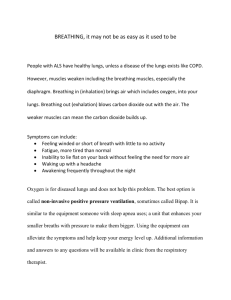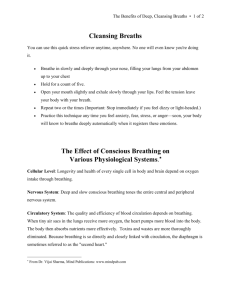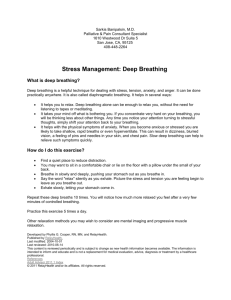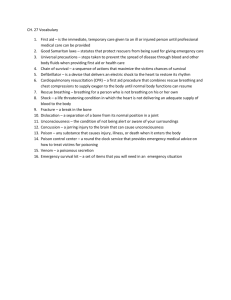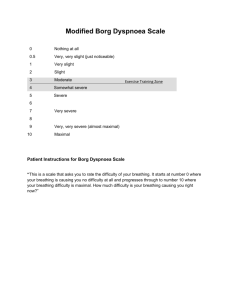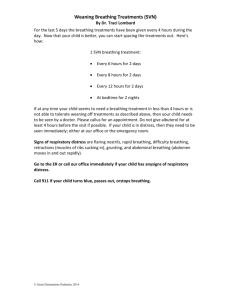Benefits of Breaths
advertisement
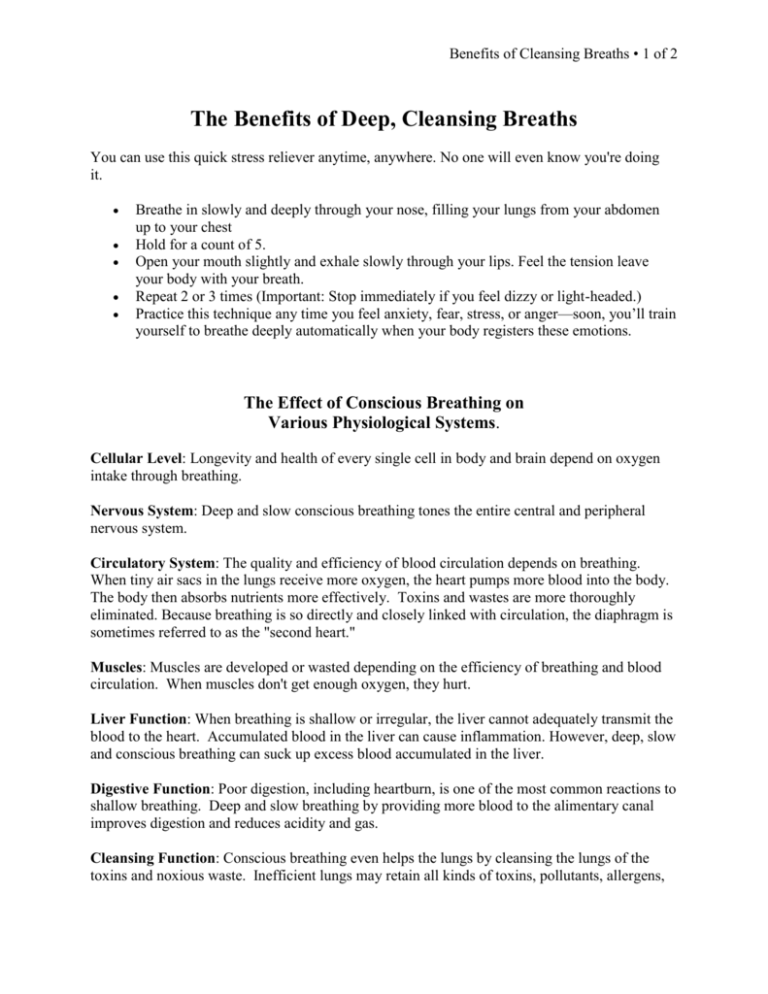
Benefits of Cleansing Breaths • 1 of 2 The Benefits of Deep, Cleansing Breaths You can use this quick stress reliever anytime, anywhere. No one will even know you're doing it. Breathe in slowly and deeply through your nose, filling your lungs from your abdomen up to your chest Hold for a count of 5. Open your mouth slightly and exhale slowly through your lips. Feel the tension leave your body with your breath. Repeat 2 or 3 times (Important: Stop immediately if you feel dizzy or light-headed.) Practice this technique any time you feel anxiety, fear, stress, or anger—soon, you’ll train yourself to breathe deeply automatically when your body registers these emotions. The Effect of Conscious Breathing on Various Physiological Systems. Cellular Level: Longevity and health of every single cell in body and brain depend on oxygen intake through breathing. Nervous System: Deep and slow conscious breathing tones the entire central and peripheral nervous system. Circulatory System: The quality and efficiency of blood circulation depends on breathing. When tiny air sacs in the lungs receive more oxygen, the heart pumps more blood into the body. The body then absorbs nutrients more effectively. Toxins and wastes are more thoroughly eliminated. Because breathing is so directly and closely linked with circulation, the diaphragm is sometimes referred to as the "second heart." Muscles: Muscles are developed or wasted depending on the efficiency of breathing and blood circulation. When muscles don't get enough oxygen, they hurt. Liver Function: When breathing is shallow or irregular, the liver cannot adequately transmit the blood to the heart. Accumulated blood in the liver can cause inflammation. However, deep, slow and conscious breathing can suck up excess blood accumulated in the liver. Digestive Function: Poor digestion, including heartburn, is one of the most common reactions to shallow breathing. Deep and slow breathing by providing more blood to the alimentary canal improves digestion and reduces acidity and gas. Cleansing Function: Conscious breathing even helps the lungs by cleansing the lungs of the toxins and noxious waste. Inefficient lungs may retain all kinds of toxins, pollutants, allergens, Benefits of Cleansing Breaths • 2 of 2 viruses and bacteria. Deep and full breaths recruit the entire lung into the act and can clean it of noxious substances. Mood Management: When the brain doesn't get enough oxygen, we feel anxious, dizzy or lightheaded. With an abundant supply of oxygen, we tend to feel energetic and cheerful. One of the best ways to calm yourself is to breathe deeply. Many people with emphysema suffer from anxiety and/or depression. Since the breathing has a direct effect on emotions, it appears that compromised breathing, as in emphysema, may contribute to such negative emotional outcomes. Conscious breathing helps to maintain a positive mental attitude, in spite of the illness. Conscious breathing and positive mental attitude aid each other by forming a virtuous cycle. Immune Function: As the controlled breathing reduces stress and negative emotions, your immune function, too, may improve. Conscious deep breathing can prevent respiratory infections including common colds. Pain Management: Deep, relaxing breaths and the practice of consciously holding and releasing of breath increase the production of endorphins, which in turn reduce the feeling of pain.
